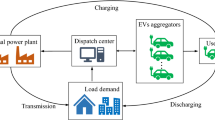Abstract
In the framework of fuel reduction and energy conservation, the electric vehicles (EV’s) has been identified as a promising option in contrast to fuel-driven vehicles. EV’s battery limits to require visiting a greater number of times to the recharging stations, which must be viewed as in the route planning to keep away from inefficient vehicle routes with lengthy diversions. These problems have to consider, we propose an Efficient Electric Vehicle Route Optimization with Time-of-Use Electricity Pricing using Bat algorithm. Which can reduce the used vehicles as well as electricity-cost and total travel distance. Additionally, functional model and collective models are used to minimize the objectives: distance and cost. The computational assessment in light of the notable benchmarking test instances exhibits, proposed optimization algorithm electricity cost conservation on average 12.17% with Learnable Partheno-Genetic Algorithm (Yang et al. in IEEE Trans Smart Grid 6:657–666, 2015) 8.45% with VNS/TS Algorithm (Lin et al. in Trans Res Part-C 130:103285, 2021) and 5.15% with Mixed Integer Programming model (Ham and Park in IEEE Access 9:37220–37228, 2021).

Similar content being viewed by others

Data Availability
The referred papers will be available on request.
Code Availability
Algorithm is available.
References
Van Fan, Y., Perry, S., Klemeš, J. J., & Lee, C. T. (2018). A review on air emissions assessment: Transportation. Journal of Cleaner Production, 194, 673–684.
Kumar, S. N., & Panneerselvam, R. (2012). A survey on the vehicle routing problem and its variants. Intelligent Information Management, 4(3), 66–74.
Solomon, M. M., & Desrosiers, J. (1988). Survey paper-Time window constrained routing and scheduling problems. Transportation Science, 22(1), 1–13.
Ritzinger, U., Puchinger, J., & Hartl, R. F. (2016). A survey on dynamic and stochastic vehicle routing problems. International Journal of Production Research, 54(1), 215–231.
Un-Noor, F., Padmanaban, S., Mihet-Popa, L., Mollah, M. N., & Hossain, E. (2017). A comprehensive study of key electric vehicle (EV) components, technologies, challenges, impacts, and future direction of development. Energies, 10(8), 1217.
Knobloch, F., et al. (2020). Net emission reductions from electric cars and heat pumps in 59 world regions over time. Nature Sustainability, 3, 437–447.
Elghitani, F., & El-Saadany, E. F. (2021). Efficient assignment of electric vehicles to charging stations. IEEE Transactions on Smart Grid, 12, 761–773.
Wang, J., Weng, T., & Zhang, Q. (2019). A two-stage multi objective evolutionary algorithm for multi objective multi depot vehicle routing problem with time windows. IEEE Transactions on Cybernetics, 49(7), 2467–2478.
Siddiqi, U. F., et al. (2011). Multi-constrained route optimization for electric vehicles (EVs) using particle swarm optimization (PSO), In: 11th International Conference on Intelligent Systems Design and Applications.
Huang, B., et al. (2020). Delivery route optimization for electric logistics vehicles based on full information acquisition, In: IEEE 4th Conference on Energy Internet and Energy System Integration (EI2).
Schneider, M., et al. (2014). The electric vehicle-routing problem with time windows and recharging stations. Transportation Science, 48, 1–21.
Booth, K. E. C., Beck, J. C. (2019). A constraint programming approach to electric vehicle routing with time windows, In: International Conference on Integration of Constraint Programming, Artificial Intelligence, and Operations Research, pp 129-145.
Desaulniers, G., et al. (2016). Exact algorithms for electric vehicle-routing problems with time windows. Operations Research, 64, 1–18.
Ferro, G., Paolucci, M., Robba, M. (2018) an optimization model for electrical vehicles routing with time of use energy pricing and partial recharging, In: 15th IFAC Symposium on Control in Transportation Systems CTS, Vol. 51, Issue 9, pp 212-217.
An, J., et al. (2013). PSO-based method to find electric vehicle’s optimal charging schedule under dynamic electricity price, In: 10th IEEE International Conference on Networking, Sensing and Control.
Yang, H., et al. (2015). Electric vehicle route optimization considering time-of-use electricity price by learnable partheno-genetic algorithm. IEEE Transactions on Smart Grid, 6(2), 657–666.
Lin, B., Ghaddar, B., & Nathwani, J. (2021). Electric vehicle routing with charging/discharging under time-variant electricity prices. Transportation Research Part-C, 130, 103285.
Ham, A., & Park, M.-J. (2021). Electric vehicle route optimization under time-of-use electricity pricing. IEEE Access, 9, 37220–37228.
Reddy, B. N. K., Kishan, D., & Vani, B. V. (2019). Performance constrained multi-application network on chip core mapping. International Journal of Speech Technology, 22, 927–936.
Bac, U., & Erdem, M. (2021). Optimization of electric vehicle recharge schedule and routing problem with time windows and partial recharge: A comparative study for an urban logistics fleet. Sustainable Cities and Society, 70, 102883.
Jia, Y.-H., Mei, Y., & Zhang, M. (2021). A bilevel ant colony optimization algorithm for capacitated electric vehicle routing problem. IEEE Transactions on Cybernetics, 52, 10855–10868.
Funding
Not Applicable.
Author information
Authors and Affiliations
Corresponding authors
Ethics declarations
Conflict of interest
Authors declare no conflict of Interest.
Ethical Approval
The authors declare that they have no known competing financial interest or personal relationships that could have appeared to influence the work reported in this paper.
Consent for Publication
All authors give the permission to the Journal to publish this research paper.
Additional information
Publisher's Note
Springer Nature remains neutral with regard to jurisdictional claims in published maps and institutional affiliations.
Rights and permissions
Springer Nature or its licensor (e.g. a society or other partner) holds exclusive rights to this article under a publishing agreement with the author(s) or other rightsholder(s); author self-archiving of the accepted manuscript version of this article is solely governed by the terms of such publishing agreement and applicable law.
About this article
Cite this article
Veena Vani, B., Kishan, D., Ahmad, M.W. et al. Bat Optimization Model for Electric Vehicle Route Optimization Under Time-of-Use Electricity Pricing. Wireless Pers Commun 131, 1461–1473 (2023). https://doi.org/10.1007/s11277-023-10494-1
Accepted:
Published:
Issue Date:
DOI: https://doi.org/10.1007/s11277-023-10494-1



